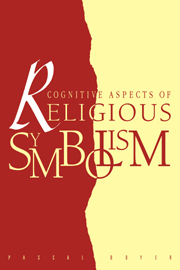Book contents
- Frontmatter
- Contents
- List of contributors
- I Cognitive processes and cultural representations
- II The structure of religious categories
- III Acquisition and belief fixation
- 7 Sign into symbol, symbol as sign: cognitive aspects of a social process
- 8 Talking about souls: the pragmatic construction of meaning in Cuna ritual language
- IV The structure of ritual action
- References
- Index of names
- Subject Index
7 - Sign into symbol, symbol as sign: cognitive aspects of a social process
Published online by Cambridge University Press: 05 November 2011
- Frontmatter
- Contents
- List of contributors
- I Cognitive processes and cultural representations
- II The structure of religious categories
- III Acquisition and belief fixation
- 7 Sign into symbol, symbol as sign: cognitive aspects of a social process
- 8 Talking about souls: the pragmatic construction of meaning in Cuna ritual language
- IV The structure of ritual action
- References
- Index of names
- Subject Index
Summary
This essay challenges a common anthropological assumption that we can demarcate a domain of ‘the symbolic’, that this domain is self-evident, located ‘out there’, its paradigm being given by ritual. This assumption itself rests on the conventional anthropological distinction between sign and symbol, where the sign is propositional or simply referential and the symbol is evocative of meaning beyond itself, and thus on the notion that the sign too is obvious. Here I argue that we should cease to make an priori distinction between sign and symbol and that we should give up the lingering notion that to understand ritual is to analyse its meaning as a relation between metaphors. At best, such an analysis can be only the first step towards understanding the peculiar power of ritual.
I argue below that the notion that any given ritual act is ‘symbolic’, that is, that it ‘stands for’ something other than itself, is the product of a process of cognitive construction in persons over time. In other words, for young children ritual is not symbolic in the conventional anthropological sense. Rather, young children take ritualised behaviour for granted as part of the day-to-day material reality of their existence. So, in the Fijian case discussed here, the ritualised drinking of kava is, for children, merely what people do when drinking kava. The activity is of the same material and cognitive order as, say, house-building. By contrast, an adult understanding of kava-drinking entails the conscious awareness that the activity is not merely an end in itself, but rather that it expresses certain intangible meanings which themselves make the ritual performance obligatory.
- Type
- Chapter
- Information
- Cognitive Aspects of Religious Symbolism , pp. 147 - 164Publisher: Cambridge University PressPrint publication year: 1993
- 23
- Cited by



